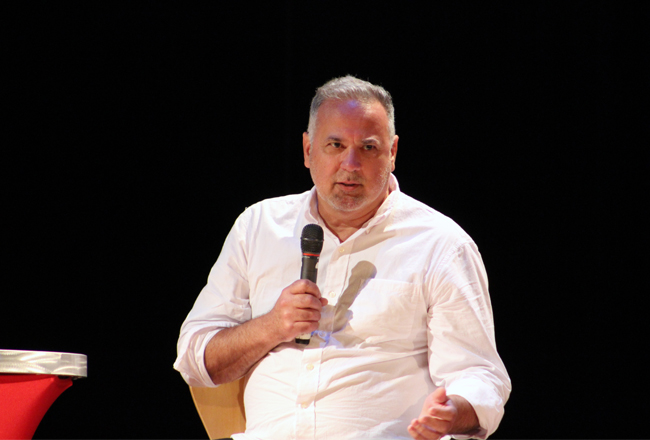On bad reviews and rising costs: Hudson Valley chefs speak out
Margins are tight already, so how can the Hudson Valley”™s top restaurateurs and chefs keep up with increasing costs?
That was the question Peter Kelly, chef and owner of X2O Xaviars on the Hudson in Yonkers and Restaurant X & Bully Boy Bar in Congers, posed to a panel of fellow chefs and restaurant owners recently at the Culinary Institute of America in Hyde Park. The chefs were gathered at the culinary college”™s Marriott Pavilion for the fall kickoff event of The Valley Table”™s biannual Hudson Valley Restaurant Week.

“It used to be a lot easier,” said Andy Nusser, executive chef at Tarry Lodge, which has locations in Port Chester, Westport and New Haven. Nusser is a partner in the restaurants with Nancy Selzer and celebrity chefs Mario Batali and Joe Bastianich.
“I think the real thing now is, how do we fix this? Well, you raise your prices. That’s what I think everyone is afraid to say out loud, but that’s actually what happens.”
When minimum wage goes up a dollar or restaurants have to provide health insurance for more employees, the answer is to raise the price on menu items as needed, Nusser said.
“So how do you raise prices and stay competitive?” Kelly countered. “I think that’s the challenge for all of us.”
Michael Kelly, chef and owner of Liberty Street Bistro in Newburgh, said price can especially be a concern for customers in his city, where he opened the restaurant last year in a downtown historic district. “You can’t price-gouge,” he said. “You can’t expect people to shell out hundreds of dollars all the time.”
Liberty Street Bistro offers set prices for two-, three- or four-course meals. The system usually allows cheaper menu items such as chicken to balance out the more expensive items such as lobster, Kelly said.
Of course, there are nights where more people want lobster than chicken. “But most of the time, almost all the time, we hit the numbers we want to and come out on top,” he said.
“My wallet”™s still empty,” Kelly said with a laugh. “But the restaurant is doing OK, so one year down and I’m happy with that. Everyone would like to make more money but you have to be happy with what you’re doing too.”
Peter Kelly also asked the chefs about using social media to bring in customers. He noted that restaurants once relied solely on newspaper and magazine reviews for publicity, but today there are fewer publications and more restaurants than can be reviewed.
David DiBari, chef and owner of The Cookery and The Parlor restaurants in Dobbs Ferry, said the amount of information out there can be overwhelming, but social media allows restaurants a way to reach customers outside of traditional outlets.
“It gives people options,” he said. “We like options, we like a bunch of information. We make our own choices. We don”™t get told by the New York Times that this place is four stars; we decide for ourselves.”
From a chef’s perspective, DiBari described social media as another outlet for creativity.
“I”™m creating things,” he said. “It gives me the power to create a great dish, take that picture, put that filter on and make it look the way I want to look”¦ I get that shot, I put it up, people come. It”™s my hands and I have that control. I like that.”
Hudson Valley Restaurant Week will run from Oct. 30 through Nov. 12 and feature more than 200 restaurants across Westchester, Rockland, Putnam, Orange, Sullivan, Dutchess and Ulster counties. Participating restaurants will offer three-course dinners for $32.95. The event is held every spring and fall.
The panel of restaurateurs also took questions from students and business owners in the crowd. One asked how to respond to negative reviews online, such as on Yelp or Trip Advisor.
Nusser said a negative review can reveal issues that need to be addressed. “The positives outweigh the negatives, you hope, if you’re in business. But the negative, if they’re valid, they should be addressed,” he said.
DiBari added that it’s good to reach out to an angry customer and apologize when possible. “Simply, ‘We are really sorry, we’re looking into that,'” he said.
“If you take a deep breath and look at it and assess what’s going on,” DiBari added, “you can learn a lot from it and fix the issue as well.”